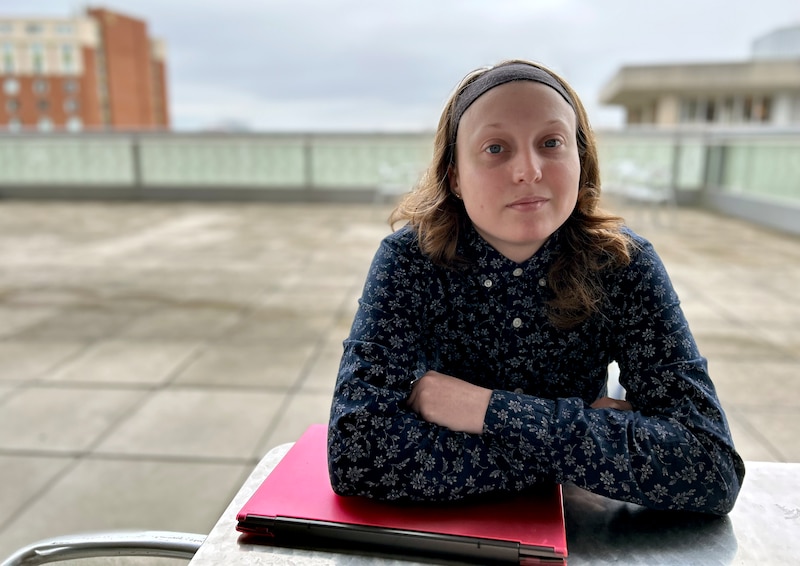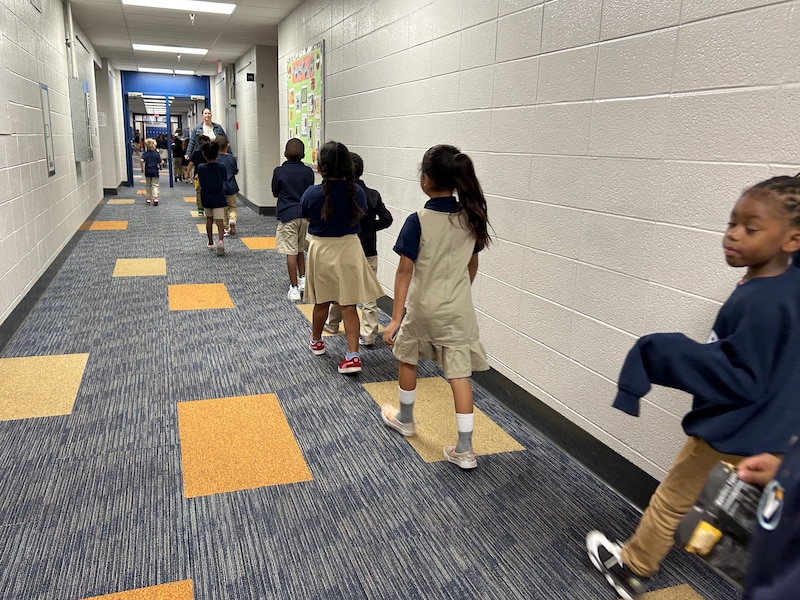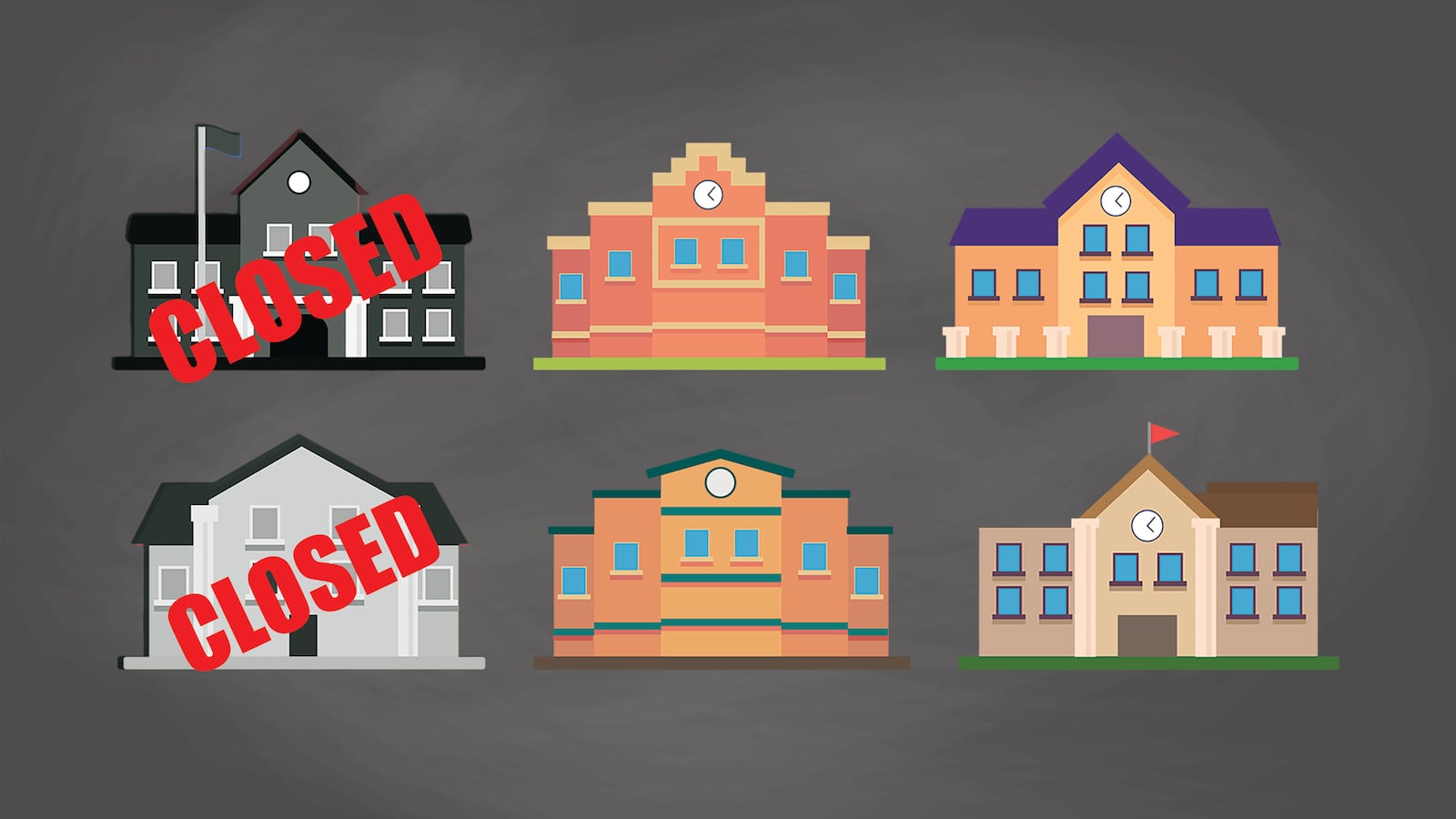Sign up for Chalkbeat Indiana’s free daily newsletter to keep up with Indianapolis Public Schools, Marion County’s township districts, and statewide education news.
On the day the Indiana Charter School Board voted to close Carpe Diem Meridian High School in 2017, Liv Pedigo stepped outside, sat on the family swing in the backyard, and cried.
Pedigo, a junior at the time, had loved Carpe Diem Meridian, a blended-model charter school using virtual and in-person learning that opened to fanfare five years earlier. The closure was a surprising turn of events for the network, which years earlier had been given permission by the Indiana Charter School Board to open six schools across the state — without any restrictions on timing.
But within about a year of the closure vote, all three of Carpe Diem’s schools in Indianapolis had shut down due to financial concerns and academic struggles.
“That was really hard for me and devastating,” Pedigo recalled. “Just because I felt like that was where I belonged. That was my home. That was where I felt safe.”

Pedigo’s school is one of 31 in-person or blended-model charter schools that have closed in Indianapolis since 2001 — roughly a third of 91 such schools, according to a Chalkbeat analysis of school identification information from the state. Some, like Carpe Diem, appeared to be given the power by authorizers to expand too soon. Some faced declining enrollment, yet were allowed by authorizers to stay open. And some were rejected by one authorizer, only to be approved by another.
While closing schools represents a form of accountability, the volume of closures turns a spotlight on Indiana’s charter authorizers. These boards, often connected to government agencies or universities, essentially provide the oversight an elected school board would for traditional public schools. As the city’s charter enrollment grows, observers question whether authorizers are doing enough gatekeeping and quality control of schools — and whether the state’s own oversight of authorizers has been lax.
Charter oversight in general has created intense controversy in Indiana in recent years, although perhaps the most prominent example doesn’t involve brick-and-mortar schools. Following a 2017 Chalkbeat investigation, state auditors alleged that operators of two virtual charter schools inflated enrollment numbers to improperly obtain and disperse tens of millions of dollars. The state sued to recover the money, and the case is still in court.
In the wake of that scandal, legislators changed state law to bolster oversight of virtual charter schools, although critics argued the legislation did not go far enough. And the challenge goes beyond virtual schools: Nowhere in Indiana does charter accountability matter more than Indianapolis, which has the highest number of charter students of any city in the state.
“I do think that more standards should be in place to hold authorizers accountable for their portfolio,” said Joseph Waddington, director of program evaluation and research at the Institute for Educational Initiatives at Notre Dame University who has studied charter authorizers. “Especially in an instance like Indiana, which affords the opportunity for many different agencies to serve as authorizer.”
Indiana is heralded by national charter groups as a paragon; last year, for the seventh year in a row, the National Alliance for Public Charter Schools said Indiana (in a tie with Colorado) had the best charter school law in the nation. Yet in its model charter law, the same group says states should require automatic closures of chronically low-performing schools, and set a minimum performance standard for an authorizer’s portfolio of schools.
Indiana law requires neither.
While Indianapolis has averaged more than one charter closure per year, it’s not necessarily clear that its closure rate of roughly 34% is a major outlier.
In Ohio, for example, over 42% of the nearly 600 charter schools that opened since 1998 had closed by the end of 2019, according to an analysis from Stéphane Lavertu, a professor at Ohio State University who has studied charter school closures. Last year, a federal watchdog found that 14% of schools receiving money from the U.S. Department of Education’s Charter School Program for states from fiscal 2006 through 2020 had either closed or never opened; that rate was over 30% of such schools in Illinois and over 60% in Kansas.
At the same time, authorizers are making decisions in a state policy environment where school accountability is essentially on hold.
Some in the authorizing community say Indiana’s suspension of A-F grades for schools has made it hard to ascertain whether a school of any type is academically successful. In addition, some in the charter sector argue that decisions like voting to close a school indicate authorizers are doing their jobs.
“Authorizing is not paint by the numbers,” said Karega Rausch, president and CEO of the National Association of Charter School Authorizers, who has also worked extensively on charter authorizing in Indiana. “It requires professionals with really high degrees of experience and judgment.”
Low enrollment factors into many charter school closures
Under state law, authorizers grant charters to prospective school operators, revoke charters for failing to meet certain standards, or choose not to renew them at the end of their term.
In addition to the Indiana Charter School Board, there are three other charter authorizers with schools in Marion County: the Indianapolis mayor’s Office of Education Innovation, Ball State University’s Office of Charter Schools, and Education One, the authorizing arm of Trine University in Angola. Authorizers collect fees for their work, which in the 2021-22 academic year ranged from roughly $307,000 to nearly $3 million for those four authorizers.
Authorizers evaluate their schools based on financial, academic, and organizational success, and submit an annual report to the state Department of Education. They also have a pre-opening process for new schools.
Authorizers’ work with each school can be long-lasting as well as detailed: They review schools throughout their charter term, which state law recently expanded to last as long as 15 years.
A Chalkbeat analysis of those four authorizers of non-virtual and blended-model charters in Marion County found that BSU had the highest rate of school closures at 75%, or six of eight.
How each authorizer holds its schools accountable — and how they determine whether to open a school — can vary, and their methods do not always protect against the factors that lead to schools shutting down.
For example, enrollment has a major impact on charters because it is tied to their per-pupil state funding; historically, charters have not been able to collect local property tax revenue like traditional public schools. Authorizers in Indianapolis say they closely monitor enrollment. Some examine the school’s budget to ensure it can remain financially stable, while others cite it as a deficiency in its evaluation of the school that could lead to probationary status.
But such measures don’t always guard against failure. HIM By HER charter school’s first academic year of 2020-21 was disrupted by the pandemic, making student recruitment a challenge. The low enrollment was a red flag for Ball State’s charter office, officials there said — but the warning and any subsequent intervention was not enough to save the school from closing in 2022.
Charter schools routinely close due to low enrollment. In 2018, four non-virtual Indianapolis charter schools closed, and all of those schools or their affiliated networks faced challenges with enrollment. Still, six new charters opened that year in Indianapolis.
Former students and employees of charter schools that struggled with enrollment described a lack of resources, general disorganization, and misplaced priorities.
Sydney Pedigo, Liv Pedigo’s older sister who also attended Carpe Diem Meridian, was skeptical when the school offered her gift cards in exchange for participating in promotional events about Carpe Diem’s expansion.
Pedigo said there was a focus on promoting the school “and not actually further investing anything in the education” of students.
Rick Ogston, founder of the Carpe Diem network, did not respond to a request for comment.
State law places no parameters on how fast a school should grow, or what to do when schools routinely fail to meet their enrollment targets. There is also no limit on how many charters an authorizer can grant to a school operator at once.
For its part, the Indiana Charter School Board eventually decided to avoid approving multiple charters for a single network at once unless the network has a plan for expansion, said James Betley, the board’s executive director. And it’s more cautious in at least one other respect.
“We don’t authorize in Indianapolis any more, really,” said Betley, who did not lead the organization when it approved Carpe Diem’s expansion. “It’s too crowded. It’s oversaturated. There are too many schools.”
After rejection, some charter schools seek approval elsewhere
For Darneatryce Scott, teaching for just a few weeks at the Genius School was “hell” before she quit in 2022.
The school struggled with staffing, she said, and she ended up teaching more subjects than she was hired for. She had to scramble to provide her own curriculum, she recalled, since it did not initially have one for several subjects.
And when she applied for the job, she said, she had no idea the school once had a different name.
The school used to be known as Ignite Achievement Academy and for a time was part of the Indianapolis Public Schools Innovation Network, a group of schools under the district umbrella that have more flexibility than traditional schools and are often charters. But in 2021, the IPS school board voted to kick the school out of the network the next school year, citing low test scores and high staff turnover.
The mayor’s Office of Education and Innovation, the school’s authorizer, allowed the school to rename itself, relocate, and stay open — but put the school on a performance improvement plan.
But this year, the school is seeking approval from another authorizer: Education One.
The Genius School did not return requests for comment.
Since 2001, at least three Indianapolis brick-and-mortar or blended charters have sought and won approval from a different authorizer, after their school or sister schools faced scrutiny from their initial authorizer.
At least another five schools were rejected in the application stage by one authorizer but later approved by another.
The charter office for Ball State approved three schools that had been previously rejected or had schools in the same network under scrutiny, the highest number among the four authorizers for schools that have opened. Trine approved two — and also recently approved a Purdue Polytechnic High School campus after the Indianapolis Charter School Board, which is part of the mayor’s Office of Education and Innovation, rejected a third Purdue Polytechnic campus amid public pushback. That campus is slated to open in 2024.
Lawmakers have added some provisions to guard against schools jumping from one authorizer to another. Authorizers that wish to issue a charter to a previously closed school must request a review by the state board of education at a hearing.
Authorizers, meanwhile, say they talk to other authorizers about previously rejected schools. And state law requires applicants to list any other authorizers they have applied to in the past five years.
But such processes don’t necessarily address those schools that hop to another authorizer before they’re even forced to close.
When Scott heard the Genius School was seeking a new authorizer, she was incredulous.
“We need to get rid of all these schools,” she said, “and stop letting them go from one [authorizer] to another.”
Charter school authorizers in a ‘zombie’ accountability stage?
State law is relatively open-ended about when or why authorizers should shut down schools.
For many years, the state used A-F school ratings for accountability purposes and to determine school improvement status. But in 2020, the state granted a hold-harmless period for those ratings due to a transition in state testing from ISTEP to ILEARN. The pandemic extended that pause, removing a high-profile accountability tool for those overseeing public schools, including charter authorizers.
In 2021, with those A-F grades still frozen, the state repealed a law requiring charter schools to shut down if they remained in the lowest category of school improvement for three consecutive years. The same year, they also repealed a law that allowed the state to suspend authorizers if they failed to close such schools.
Authorizers say the state accountability vacuum has left them to judge schools with a medley of data points – from progress on national assessments to how a charter compares to neighboring schools – to determine academic success. Legislators haven’t enacted new oversight measures for charter schools and authorizers to take the place of the previous two mandates.
“It is a bit of a zombie state right now, I think, as far as trying to evaluate the performance of schools,” said Jamie Garwood, director of Ball State’s Office of Charter Schools.
State lawmakers have tasked the Indiana Department of Education to develop a revised school performance rating, using the A-F grading scale, by December 2024.
Rep. Bob Behning, an Indianapolis Republican who chairs the House Education Committee, said he would be open to new accountability measures for authorizers.
“Do I see that we’ll be putting consequences back in statute soon? Probably not,” he said. “It’s hard to see a world where you’re going to put consequences in place where you don’t have accountability.”
He also warned against overregulation that could hinder authorizers from giving the green light to schools that may deserve a chance.
Victory College Prep, for example, left a charter management network to become an independent charter in 2019, after the mayor’s Office of Education and Innovation renewed the school.
Since then, said the school’s executive director Ryan Gall, the school has gone on an upward trajectory, improving its academic outcomes and financial management. Throughout that time, the mayor’s office has held them accountable, he said.

Gall questioned the scrutiny on authorizers’ work. What matters more, he said, is how charters fare compared to traditional public schools nearby.
A Chalkbeat analysis of the latest state test results show that on ILEARN tests, students in charter schools not affiliated with IPS outperformed students in IPS-controlled schools.
And schools run by IPS close and create instability for students too, Gall noted. Since 2001, at least 17 traditional IPS schools have closed.
“Have charter schools over the last 20 years been a better option?” Gall said. “I would argue we have.”
But that’s not much comfort for Sydney Pedigo, who graduated from Carpe Diem Meridian.
Given another chance, she would tell the Indiana Charter School Board not to approve the other two charters for the additional schools. That way, she said, maybe the network could have focused all its attention on Carpe Diem Meridian.
“It would’ve been solid before actually expanding,” she said. “It could’ve done what it was intended to do.”
Clarification: Nov. 30, 2023: A previous version of this story said Purdue Polytechnic High School’s application was rejected by the mayor’s office. This story has been updated to clarify the rejection was made by the Indianapolis Charter School Board in the mayor’s Office of Education Innovation.
Amelia Pak-Harvey covers Indianapolis and Lawrence Township schools for Chalkbeat Indiana. Contact Amelia at apak-harvey@chalkbeat.org.

